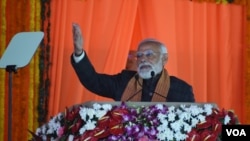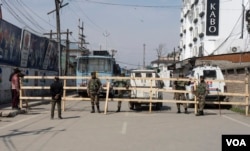ນາຍົກລັດຖະມົນຕີຂອງອິນເດຍ ທ່ານນາເຣັນດຣາ ໂມດີ ໄດ້ເດີນທາງໄປຢ້ຽມຢາມແຄວ້ນແຄສເມຍຂອງອິນເດຍ ເປັນຄັງທຳອິດ ໃນວັນພະຫັດວານນີ້ ນັບຕັ້ງແຕ່ລັດຖະບານຂອງທ່ານ ໄດ້ລົບລ້າງສະຖານະການປົກຄອງຕົນເອງເຄິ່ງນຶ່ງຂອງຂົງເຂດພູຮິມາໄລ ເມື່ອເກືອບຫ້າປີກ່ອນ.
ທ່າມກາງການຮັກສາຄວາມປອດໄພທີ່ເຄັ່ງຄັດ ທ່ານໂມດີ ໄດ້ກ່າວຕໍ່ຝູງຄົນທີ່ໄດ້ມາຟັງທ່ານຢູ່ທີ່ສະໜາມກິລາ ບາກຊີ ຢ່າງໜາແໜ້ນ ໃນເມືອງຫຼວງ ສຣີນາກາ ຂອງຂົງເຂດດັ່ງກ່າວນັ້ນວ່າ ແຄວ້ນແຄສເມຍ ໄດ້ເຫັນການປ່ຽນແປງຢ່າງຫຼວງຫຼາຍ ແລະໄດ້ຈະເລີນຂຶ້ນນັບຕັ້ງແຕ່ລັດຖະບານຂອງທ່ານເອົາມາດຕະການທີ່ກ່າວມານັ້ນ ເມື່ອວັນທີ 5 ສິງຫາ ປີ 2019.
ໃນມື້ນັ້ນ ທ່ານໂມດີ ໄດ້ນຳພາລັດຖະບານຂອງພັກບາຣາຕີຍາ ຈານາຕາ ຫຼື BJP ຍົກເລີກມາດຕາ 370 ແລະມາດຕາ 35A ຂອງລັດຖະທໍາມະນູນຂອງອິນເດຍ. ແຄວ້ນແຄສເມຍ ໄດ້ສູນເສຍສະຖານະພິເສດຂອງຕົນ ທີ່ນຳໄປສູ່ການແບ່ງແຍກຂົງເຂດນີ້ ເປັນສອງດິນແດນຂອງລັດຖະບານກາງ ຄື ເຂດຈາມມູ ແລະ ແຄສເມຍ ຫຼື J&K, ແລະ ເຂດລາດາກ. ທັງສອງພື້ນທີ່ນີ້ ໄດ້ຖືກປົກຄອງໂດຍລັດຖະບານກາງ ແລະບໍ່ມີສະພານິຕິບັດຍັດຂອງເຂົາເຈົ້າເອງ.
ທ່ານໂມດີ ໄດ້ກ່າວວ່າ “ມື້ນີ້ ຈາມມູແລະແຄສເມຍ ກຳລັງສຳພັດກັບການພັດທະນາລະດັບສູງໃໝ່ເພາະວ່າ J&K ຫາຍໃຈໄດ້ຢ່າງເສລີໃນມື້ນີ້. ເສລີພາບທີ່ປາດສະຈາກຂໍ້ຈຳກັດໃດໆ ໄດ້ມາຮອດແລ້ວຫຼັງຈາກການຍົກເລີກມາດຕາທີ 370.”
“ພັກການເມືອງສ່ວນນ້ອຍ ໄດ້ໃຊ້ມາດຕາ 370 ສຳລັບຜົນປະໂຫຍດດ້ານເມືອງຂອງເຂົາເຈົ້າເອງ ແຕ່ອັນນັ້ນ ບໍ່ມີອີກແລ້ວ” ທ່ານໂມດີ ໄດ້ກ່າວຕື່ມ ຊຶ່ງປະກົດວ່າ ອ້າງອີງເຖິງສອງພັກການເມືອງຂອງຂົງເຂດທີ່ສະໜັບສະໜຸນອິນເດຍ, ເຊັ່ນ ພັກກຸ່ມແຫ່ງຊາດ ແລະພັກປະຊປະຊາທິປະໄຕຂອງປະຊາຊົນ (National Conference and People’s Democratic Party), ໂດຍບໍ່ໄດ້ເວົ້າເຖິງຊື່ຂອງພວກເຂົາເຈົ້າ.
Indian Prime Minister Narendra Modi on Thursday visited Indian Kashmir for the first time since his government stripped the Himalayan region of its semiautonomous status nearly five years ago.
Amid tight security, Modi told a crowd that had packed the Bakshi Stadium in the region's capital, Srinagar, that Kashmir has seen significant changes and prospered since his government took action on August 5, 2019.
On that day, the Modi-led Bharatiya Janata Party (BJP) government nullified Articles 370 and 35A of the Indian constitution. Kashmir's loss of its special status led to the division of the region into two federal territories – Jammu and Kashmir, and Ladakh. Both areas are ruled by the central government and have no legislatures of their own.
"Today Jammu and Kashmir is touching new heights of development because J&K is breathing freely today. This freedom from restrictions has come after the abrogation of Article 370," Modi said.
"Few political parties used Article 370 for their own political benefits, but that's over now," he added, apparently referring to the two regional pro-India political parties, the National Conference and the People's Democratic Party, without mentioning their names.






ຟໍຣັມສະແດງຄວາມຄິດເຫັນ